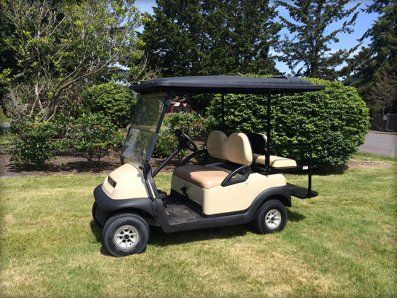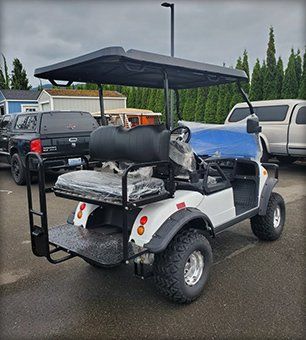NW Golf Carts FAQ
After-Hours Service AvailableFree ConsultationsYour Happiness Is Our Priority
Find Answers to Frequently Asked Golf Cart Questions
Should I buy a gas golf cart of an electric golf cart?
The first major decision when purchasing a new golf cart is to choose between a gas or battery-powered golf cart. There are pros and cons for each side, so it is better to review your situation to determine which golf cart is better for you.
Electric golf carts run nearly silently and have no fuel smells or oil changes to deal with. Gas golf carts are a little noisier, and the ride is typically not as smooth. Electric golf carts need to have their batteries charged at the minimum of once a month, so if you intend to leave your cart alone for six months at a time, then maybe a gas golf cart would be better for you.
Electric golf carts also need to have someone check their water level periodically and add distilled water accordingly.
Gas golf cart accessories will also rely on battery power. However, they feature a starter/generator that will charge the battery on its own while the gas pedal is depressed. This doesn’t mean a gas golf cart battery is invincible – any accessories left on while the cart isn’t running will eventually kill your battery.
Performance:
In the beginning, golf cars were designed to simply be what their name implies – cars for golfing. While either type of cart can easily haul you and a friend around most reasonable kinds of terrain, there are other points to consider when making a decision – especially for those who expect (or demand) a little more.
With horsepower ratings ranging from 10 to 12 HP, gas golf cars are as much as three to four times more powerful than their electric counterparts. An electric golf cart, on average, will feature a three- to five-HP electric motor – but that’s not to say electric carts aren’t impressively powerful in their own right.
Light hauling and yard work can be done with either type of vehicle, and both will perform satisfactorily. However, those who demand power in off-road conditions with rugged terrain and steep inclines will almost always want to stick with gas power.
As we mentioned before, electric golf carts aren’t for those who wish to joy ride for hours a day. An electric cart will typically get around two hours of continuous motor run time before the batteries will need re-charging. This translates to anywhere between 18 and 25 miles depending on usage and the terrain – still pretty impressive.
On the gas side of things, manufacturers have made great strides in improving gas efficiency, and the Yamaha Drive currently leads the pack in fuel economy by averaging nearly 29 MPG.
Aside from power sources and horsepower ratings, both types of vehicles operate in much the same fashion. To the untrained eye, you couldn’t tell the two apart from each other, and for the most part, they both ride and handle the same. Both types of vehicles will get about 14-15 mph top-speed (unmodified).
Technology has improved and electric golf carts have AC motor options. Gas golf carts are going to EFI versus carburetor cars.
Maintenance:
All in all, both types of golf carts have fairly light requirements when it comes to maintenance. With electric carts, your main concern lies within your batteries – make sure you check the water levels monthly (at least) and top off as needed.
Batteries are the lifeblood of an electric car, and with a replacement set costing well over $800 these days, it’s not something you want to ignore. With proper maintenance of batteries and responsible charging habits, you can expect to get five to six years (sometimes longer) of solid performance before they will need replacing. In comparison, neglecting your batteries can shorten their lifespan to as little as one to two years.
Gas golf carts, on the other hand, do require periodic oil changes as well as replacement air/fuel filters and spark plugs when necessary. For the do-it-yourselfer, it’s pretty routine stuff if you don’t mind getting a little dirty. Filters are relatively inexpensive, and golf cart motors only take about a quart of 10W30 oil after every 250 hours of motor run time.
The best way to stay on top of maintenance is to purchase and install an hour meter for the motor. With proper care, a gas golf cart can last you a lifetime. The majority of new gas golf carts do not have this feature, so when you resell, the hour meter adds value.
On the Club Car DS Golf Cart, what does the DS represent?
The original Club Cart was the 1964 Caroche, which was known as the “C Series” cart within the Johns Manville organization.
Club Car bought the company in 1979, and in 1981 they introduced a completely new design which was the “D Series.” It was shortened to DS and remained as the model designation. Other than some plastics type changes, the body of the DS cart has been essentially the same since it was introduced.
If you have any other questions about our golf carts or our services, don't hesitate to contact NW Golf Carts in Mount Vernon, WA. Call us anytime at (360) 757-2233 for a free consultation, or simply stop by and talk to us!
Call (360) 757-2233
for a free consultation!
Locally and family owned since 1989.







Share On: